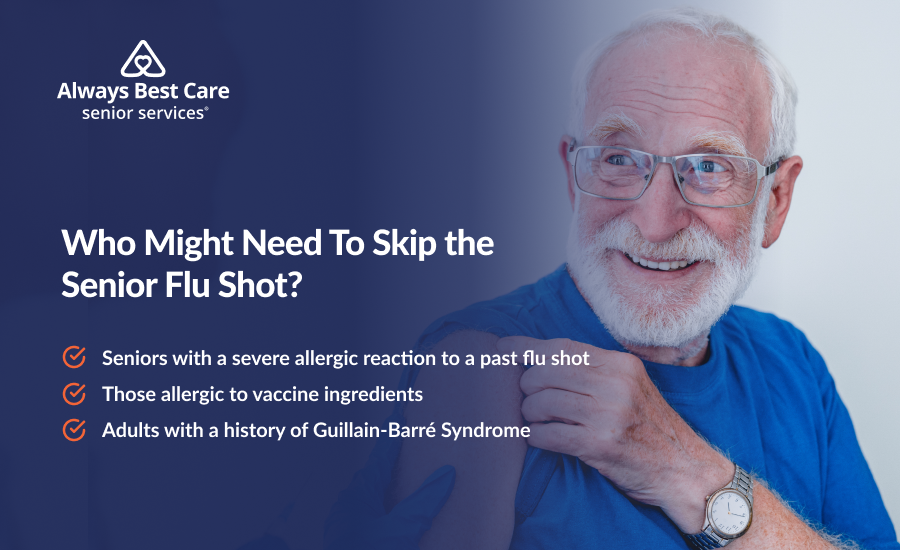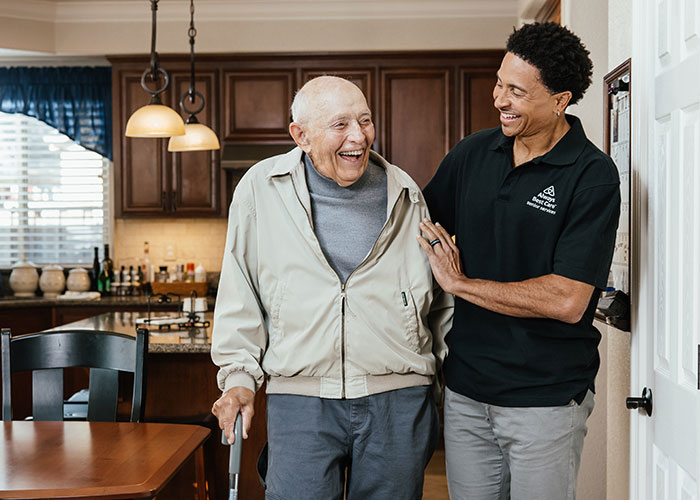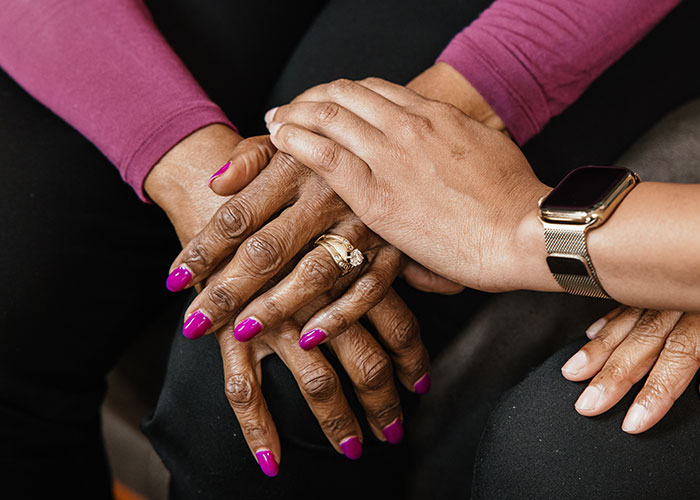Flu Vaccine for Seniors [Types, Expert Tips & FAQs]
![Flu Vaccine for Seniors [Types, Expert Tips & FAQs]](https://cdn.alwaysbestcare.com/wp-content/uploads/2025/09/flu-vaccine-for-seniors-hero-image.png)
Table of Contents
Flu Vaccine for Seniors Explained: Key Takeaways
- Adults 65 and older benefit most from flu vaccines made specifically for seniors, like the high dose, adjuvanted, or recombinant versions
- The flu vaccine for seniors offers the strongest protection against serious complications like pneumonia and hospitalization
- The best time to get the flu vaccine for seniors is during September or October
Flu season can be tough on everyone, but it tends to hit older adults the hardest.
In fact, people 65 and older typically experience the most severe effects. This age group makes up roughly 50 to 70% of flu-related hospitalizations each year, showing just how serious the virus can be.
That’s why the flu vaccine for seniors is important, as it helps lower the risk of complications and makes recovery more manageable.
By the end of this guide, you’ll know how to:
- Choose the right flu vaccine for your elderly loved one
- Recognize the red flags that may signal a flu shot isn’t the right choice
- Treat flu symptoms and take simple steps to help prevent illness before it starts
Understanding the Flu Vaccine for Seniors
The flu vaccine for seniors helps protect older adults from influenza and lowers their risk of serious complications such as:
- Pneumonia
- Hospitalization
- Worsening of chronic conditions
What Types of Flu Vaccines Are Available?
Each flu season, the CDC recommends using a vaccine that’s both licensed and age-appropriate, and for the recent season, all available flu vaccines in the U.S. are quadrivalent.
That just means they’re designed to protect against four different flu viruses: two strains of influenza A and two of influenza B.
You’ve got a few options to pick from:
- Inactivated influenza vaccine (IIV4)
- Recombinant influenza vaccine (RIV4)
- Live attenuated influenza vaccine (LAIV4)
Some vaccines are better suited for certain age groups. For older adults, particularly those 65 and up, these three are highly recommended:
- A recombinant flu vaccine
- A high dose quadrivalent flu shot
- An adjuvanted flu shot, which helps boost the body’s immune response
Who Should Not Get the Senior Flu Shot?
Most adults 65 and older can safely get a flu shot, and it’s strongly recommended since the flu can lead to serious complications.
But there are a few exceptions.
You should talk to your elderly loved one’s general practitioner (GP) first if your senior loved one:
- Had a severe allergic reaction to a flu shot in the past: This includes serious symptoms like trouble breathing, swelling, or hives.
- Is allergic to any ingredients in the vaccine: While some flu shots are made using egg proteins, even people with severe egg allergies can usually get any flu vaccine safely. That said, there are egg-free options like the cell-based or recombinant vaccines, so you and your doctor can choose what feels best for you.
- Had Guillain-Barré Syndrome (GBS): Guillain-Barré Syndrome is a rare neurological condition, and if they’ve had it before, your loved one’s Doctor might advise against getting the flu shot.

When Should You Get the Flu Shot?
The best time to get your annual flu shot is in September or October, when it’s early enough to give your body time to build protection before the flu starts making its rounds.
Typically, the flu season kicks off in October and peaks during December through February.
Since it takes about two weeks for the flu vaccine for seniors to become fully effective, getting your shot by the end of October gives your body a head start.
Think of it like getting ready for winter, you’ll want to make sure your elderly loved one gets the flu vaccine before the cold weather and those pesky germs arrive.

How Do You Know if Your Elderly Loved One Has the Flu
Flu symptoms in older adults are generally the same as in everyone else.
Take note of these symptoms first if you think your loved one is under the weather:
- A fever that comes on suddenly
- Headache
- Sore throat
- Runny or stuffy nose
- Feeling tired or worn out
- Body aches and pains
- A cough that sticks around
How Do You Treat the Flu in the Elderly?
If your loved one comes down with the flu, the right care at home can make a big difference in how quickly they recover and how comfortable they feel.
1. Make Sure Your Loved One Takes It Easy
The flu drains a lot of energy, which is why older adults usually need more rest to start feeling better.
Whether that means taking extended naps or watching favorite shows, rest helps the immune system fight the virus.
2. Keep Your Loved One Well Hydrated
Water is important, but so are other fluids like herbal tea, clear broth, or diluted juice.
These keep the body hydrated, loosen mucus, and make it easier to cough up congestion before it turns into something more serious, like a chest infection.
3. Clear Congestion With Steam
If your loved one isn’t feeling well, over-the-counter pain relievers like Tylenol can help lower a fever and ease those achy muscles.
Just be sure to check with their Doctor or pharmacist first, as some medications don’t mix well with prescriptions they might already be taking.
4. Soothe Coughs and Congestion
Sugar-free cough drops, a little honey in warm tea (if it’s safe for them), or a cool mist humidifier can all bring some relief.
Saline sprays or rinses are another gentle way to clear up a stuffy nose without being harsh.
5. Clear Congestion With Steam
If your loved one feels all stuffed up, a few minutes in a warm, steamy bathroom can help open things up and loosen mucus.
6. Use a Humidifier
Dry air in the house can make a cough feel even worse. A cool mist humidifier adds a little moisture back into the air, which can make it easier for your loved one to breathe.
Don’t forget to wipe it down often; dirty tanks can grow mold quickly.
7. Offer Soothing Options
Cough drops or sugar-free lozenges can help soothe a sore throat and calm a nagging cough.
Pair that with a warm blanket, a good book, or even some friendly company, and your loved one will feel much more comfortable.
8. Talk to Their Doctor About Antivirals
Since older adults are at higher risk of flu complications, call their doctor as soon as symptoms appear.
Antivirals can work best when started early, especially if symptoms hit hard or fast.
6 Helpful Tips To Prevent the Flu in Older Adults
Flu season isn’t fun for anyone, but it can be especially difficult for older adults, who face a higher risk of serious complications.
Here’s how to give your elderly loved one’s immune system a fighting chance this flu season.
1. Get the Flu Shot Every Year
This is your senior loved one’s best defense. For adults 65 and older, ask their doctor about vaccines made specifically for seniors, like the high-dose or adjuvanted versions.
2. Wash Your Hands Regularly
It might sound like a no-brainer, but frequent handwashing with soap and water can help keep germs away.
When you’re out and about with your loved one, keep a small bottle of hand sanitizer handy (just in case!)
3. Stay Away From Sick People When Possible
If someone around your loved one is coughing, sneezing, or running a fever, it’s best to minimize close contact when possible.
Encourage them to wear a mask, keep conversations at a safe distance, and avoid physical contact like hugs or handshakes until they’re feeling better.
4. Keep Your Elderly Loved One’s Immune System in Good Shape
Make sure your loved one is eating balanced meals, getting plenty of water throughout the day, moving a bit with light exercise, and getting good rest at night.
These everyday habits give the body the strength it needs to fight off infections.
5. Stay on Top of Other Vaccines
Vaccines for pneumonia, COVID-19, and even RSV can help protect your elderly loved one from other illnesses that might show up during flu season, or that can make things worse if they hit at the same time.
6. Know Your Options if Your Loved One Is Exposed
If your loved one has been around someone with the flu or starts showing symptoms, talk to their doctor right away.
In some cases, their doctor might prescribe antiviral medication to help shorten the illness or keep it from getting more serious.

Help Your Loved One Recover Comfortably at Home With Always Best Care
At Always Best Care, we don’t administer the flu vaccine for seniors, but do recognize its importance in preventing serious complications.
If your loved one is recovering from the flu or just needs some extra support during flu season, our caregivers can step in to help with meals, medication reminders, or simply be there for comfort and companionship.
If a hospital stay occurs, our hospital-to-home services make the transition smoother and safer, so your loved one can focus on healing in the comfort of home.
Flu Vaccine for Seniors: FAQs
What are the side effects of the flu shot for seniors?
Most side effects are mild and go away within a few days. Seniors might experience:
- Headache
- Low-grade fever
- Muscle aches or fatigue
- Soreness, redness, or swelling at the injection site
How long does the flu shot last for seniors?
The flu shot protects for about six months, just enough to get through the entire flu season.
What to avoid after a flu shot?
After getting the flu shot, seniors should avoid:
- Strenuous physical activity for the rest of the day, especially if they feel tired or sore
- Touching or massaging the injection site, which might increase soreness or irritation
- Alcohol, which can interfere with the immune response and worsen side effects





